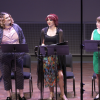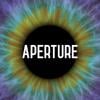
What sets West Edge Opera (WEO) apart from other companies, says Musical Director Jonathan Khuner, is its proud flouting of tradition.
“We’re committed to doing productions in an inventive, lively way that develops new audiences and takes a new approach to opera,” Khuner said. “We sort of cast aside the traditional trappings of opera and get more to the essence of each piece and make it applicable to our time and our artists and audience.”
That means WEO is the perfect company to present a double bill of two rarely staged operas — Arnold Schoenberg’s Erwartung and Igor Stravinsky’s The Nightingale — at Oakland’s Scottish Rite Center July 29, Aug. 4, and Aug. 6.
“Erwartung is very seldom done because it’s extremely difficult and it’s only a half-hour long,” said Khuner, who is conducting both pieces. “So you can’t do it by itself. You have to do it on a double bill. It’s got one singer in a situation which seems relatively static, so it’s not a showy piece.

“It’s about inner psychology,” Khuner continued. “When we do it, we’re taking it apart, and we’re putting her [the soprano] in a more active relationship with her environment, and we see her experience through other lenses. It’s dissonant and nontonal and hard-to-comprehend music at first listen, but it’s very beautiful and atmospheric, and it does have a coherence to it, which you get even on first hearing it. It’s a very powerful piece.” He adds that he grew up hearing Schoenberg played by his violinist father and that he has always looked forward to tackling Erwartung.
Khuner says the companion piece, Stravinsky’s The Nightingale, based on the fairy tale by Hans Christian Anderson, is just as compelling. He calls it less of an opera and more of a pantomime ballet with some singing and describes how WEO has turned it into a multimedia piece.
“We’re putting singers onstage who were originally offstage, and we’re developing it into a story that’s enriched by our perspective,” he said. “We’re giving it meaning for current times, so the spirit of the nightingale, who is really the spirit of art and creativity, is also seen as the spirit of society reflecting on itself, that kind of poetic spirit, and we see that in action in our production.”
Khuner describes how the two operas were written around 1909, when both composers were at critical points in their careers. Schoenberg was in his 30s and deciding that tonal music could no longer sustain his artistic vision, while Stravinsky was moving toward modernism.
“He was writing in a more advanced way, a way nobody else was,” Khuner said of Stravinsky. “And then he put his pen down after he wrote the first act [of The Nightingale], which is the first 15 minutes or so of this 40-minute piece. After he wrote his three famous ballets and settled in Paris, he was prevailed upon to finish this [opera] that he had started in 1909, and he finished it in 1914. Now at that point, he was a much different composer because he had written The Firebird, Petrushka, and The Rite of Spring, which was the most modern, avant-garde piece he had written [up to that point]. So now he was writing in this new style, and the opera suddenly turns to this dissonant, strange, and seemingly disconnected style.

“So both these pieces have a certain avant-garde feeling about them, which I think is really interesting and makes them go together, even though the two composers were completely dissimilar in their outlook on music and life.”
The music for both pieces is demanding, requiring careful rehearsal, and the orchestration is “kaleidoscopic,” Khuner says, with the Schoenberg piece changing every few seconds due to the story’s stream-of-consciousness style. Khuner thinks this double bill is the most challenging production he’s ever conducted, making for a thrilling and interesting experience.
Director Giselle Ty agrees that doing both pieces together is particularly exciting. Part of the thrill is seeing a live performance and being in a space with an orchestra playing such difficult and demanding music, she says.
In her director’s note for the production, Ty writes about a “love of the ephemeral.” She explains that in the age of YouTube, we can watch performances again and again, and sometimes we expect and want perfection. But there’s something exhilarating about being in a room and seeing performers go beyond what they think they can do — or maybe even make a mistake.
“It’s about embracing all the variations that come with live performance and also the communal event that happens when we all have to sit in the theater and experience the story and are moved at the same time — not one person alone in their living room, watching Netflix,” she said. “You have to share space with people who are breathing and with performers who are sweating. I love it because every performance is so different and it disappears. Once it’s done, it’s done.”
Ty also writes in her director’s note that “prioritizing simulation over investigation in the theater has always seemed to me a futile and unsatisfying pursuit.” Asked about this, Ty says she feels there can sometimes be of fetishization of the European past with opera and a requirement that artists and audiences attach themselves to that history.
“I think it would be more interesting if we got to the kernel of the story and tried to sort of make it explode in a way that makes us confront a lot of questions,” she said. “Or at least have an intense emotional experience.”



